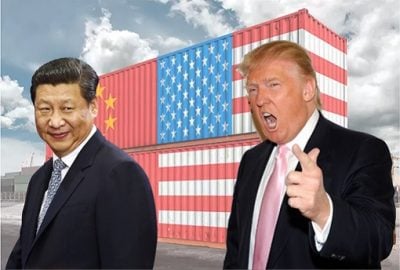Sino/US Trade War Averted?

VISIT MY NEW WEB SITE:
Contact at [email protected].
Following May 17 and 18 trade talks in Washington, a joint statement said the following:
“To meet the growing consumption needs of the Chinese people and the need for high-quality economic development, China will significantly increase purchases of United States goods and services. This will help support growth and employment in the United States.”
“There was a consensus on taking effective measures to substantially reduce the United States’ trade deficit in goods with China.”
Lead Beijing trade negotiator/Vice Premier Liu He said it’ll take time to resolve differences between both countries. In 2017, China’s trade surplus with America was a record-high $375 billion.
The devil is in the details on what was agreed on – to be discussed in further talks. Nor was anything said about Trump’s announced tariffs on Chinese imports.
Beijing agreed to increase purchases of US agricultural and energy products – insisting “the expansion of US imports must meet the urgent needs of its country’s economic and social development,” according to China’s Global Times (GT), adding:
“China believes that in order to reduce the US trade deficit, the US should further open its domestic market to Chinese buyers.” Beijing wants access to US high-tech products.
GT called this issue a key bilateral trade sticking dispute, certain US products off-limits to Chinese buyers. Beijing wants this policy ended.
Both countries agreed to increase trade in manufactured goods and services, as well as encourage “two-way investment.”
They agreed to cooperate in protecting intellectual property, along with maintaining high-level contacts to resolve trade disputes.
They vowed to avoid a trade war. China’s delegation was led by Vice Premier Liu He, Washington represented by Treasury Secretary Steven Mnuchin, Commerce Secretary Wilbur Ross and Trade Representative Robert Lighthizer.
According to analyst Suisheng Zhao,
China won’t “offer a $200 billion cut in the trade deficit in the near future. This is a much more long-term effort.”
“Both sides want to reach some kind of deal. It’s just that each side is trying to push the other side to make more concessions.”
“(T)here’s no quick solution” to bilateral differences on trade. It’s unclear when further talks will be held.
Alliance for American Manufacturing president Scott Paul expressed disappointment, saying talks didn’t achieve a bilateral playing field, adding:
“Sometimes it’s better to walk away from the negotiating table to reinforce the point to China that our resolve is strong. We need more details, but I’m not encouraged by the direction these talks are headed.”
China’s Foreign Ministry dismissed the reported claim that Liu offered to cut the trade surplus with America by $200 billion, adding talks continue.
For now, it appears a trade war is averted. Whether consensus can be reached on key sticking points could prove another matter entirely. Bilateral differences are far from resolved.
*
Stephen Lendman is a Research Associate of the CRG, Correspondent of Global Research based in Chicago.
VISIT MY NEW WEB SITE: stephenlendman.org (Home – Stephen Lendman). Contact at [email protected].
My newest book as editor and contributor is titled “Flashpoint in Ukraine: How the US Drive for Hegemony Risks WW III.”
http://www.claritypress.com/LendmanIII.html

